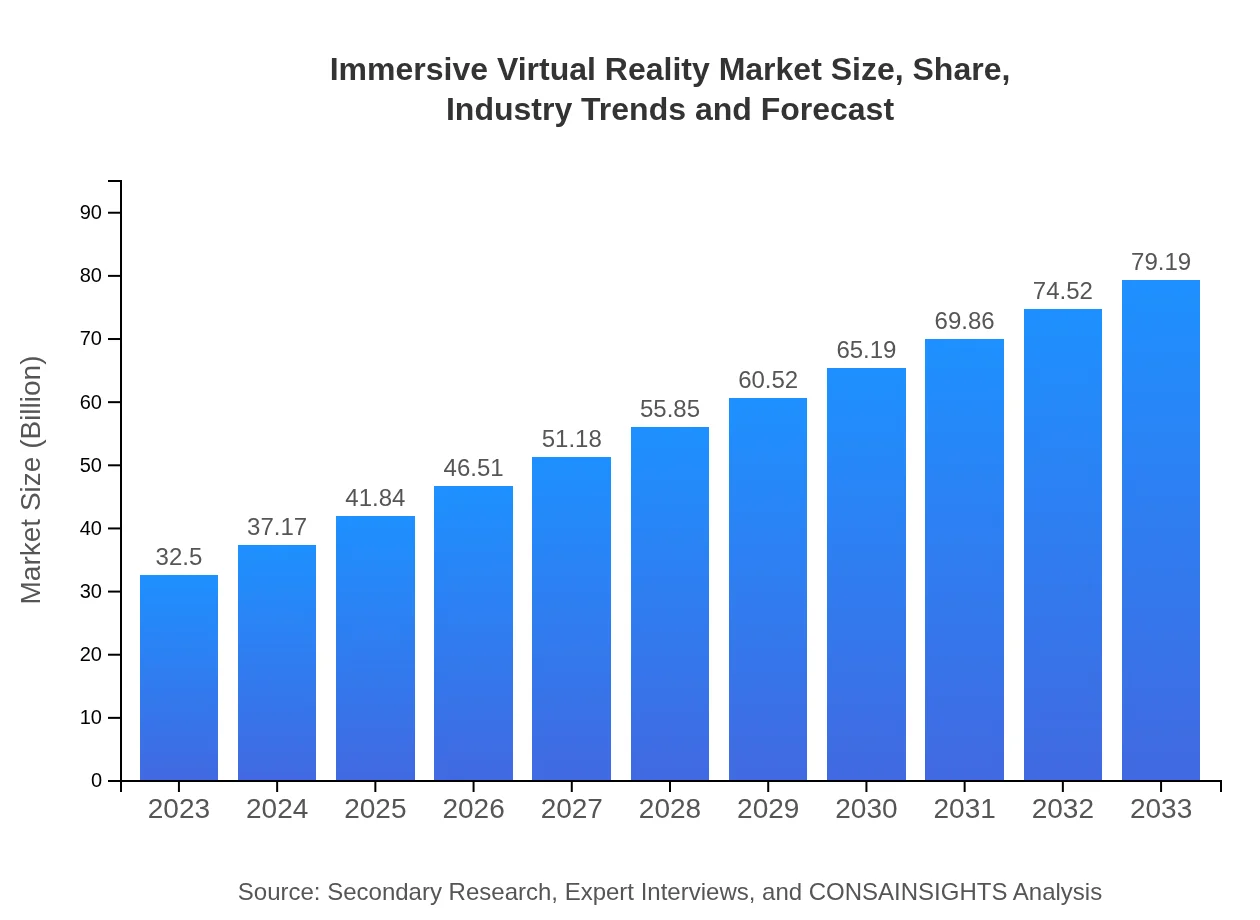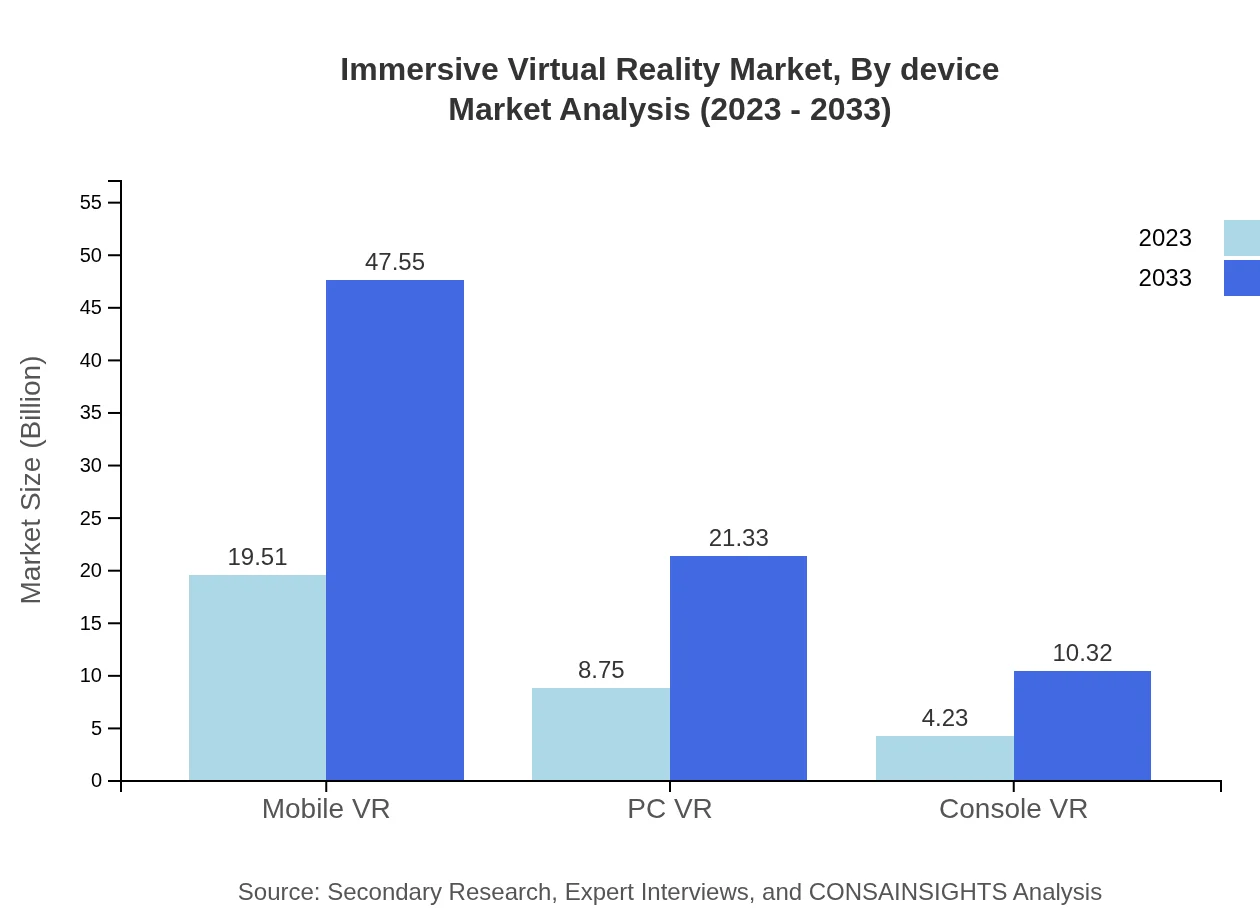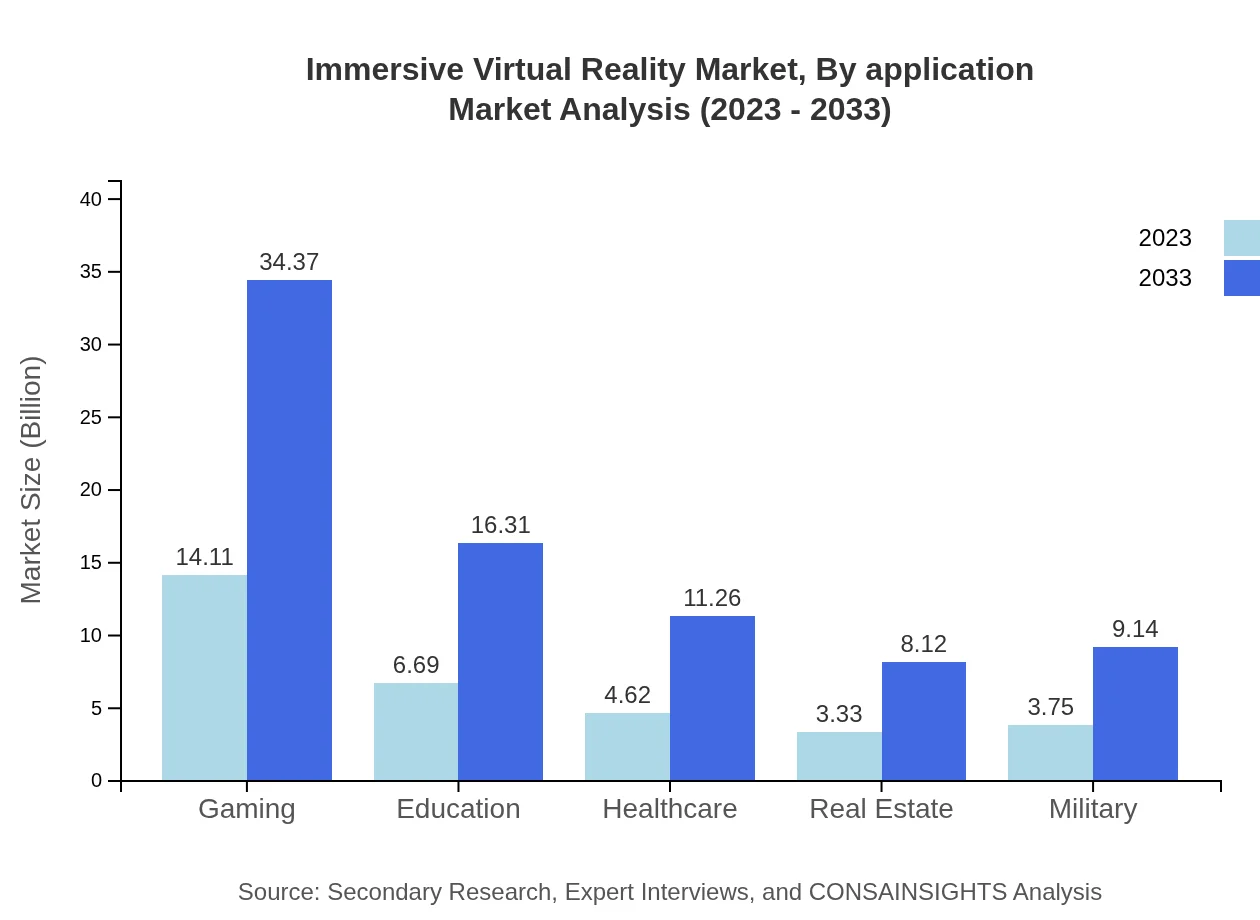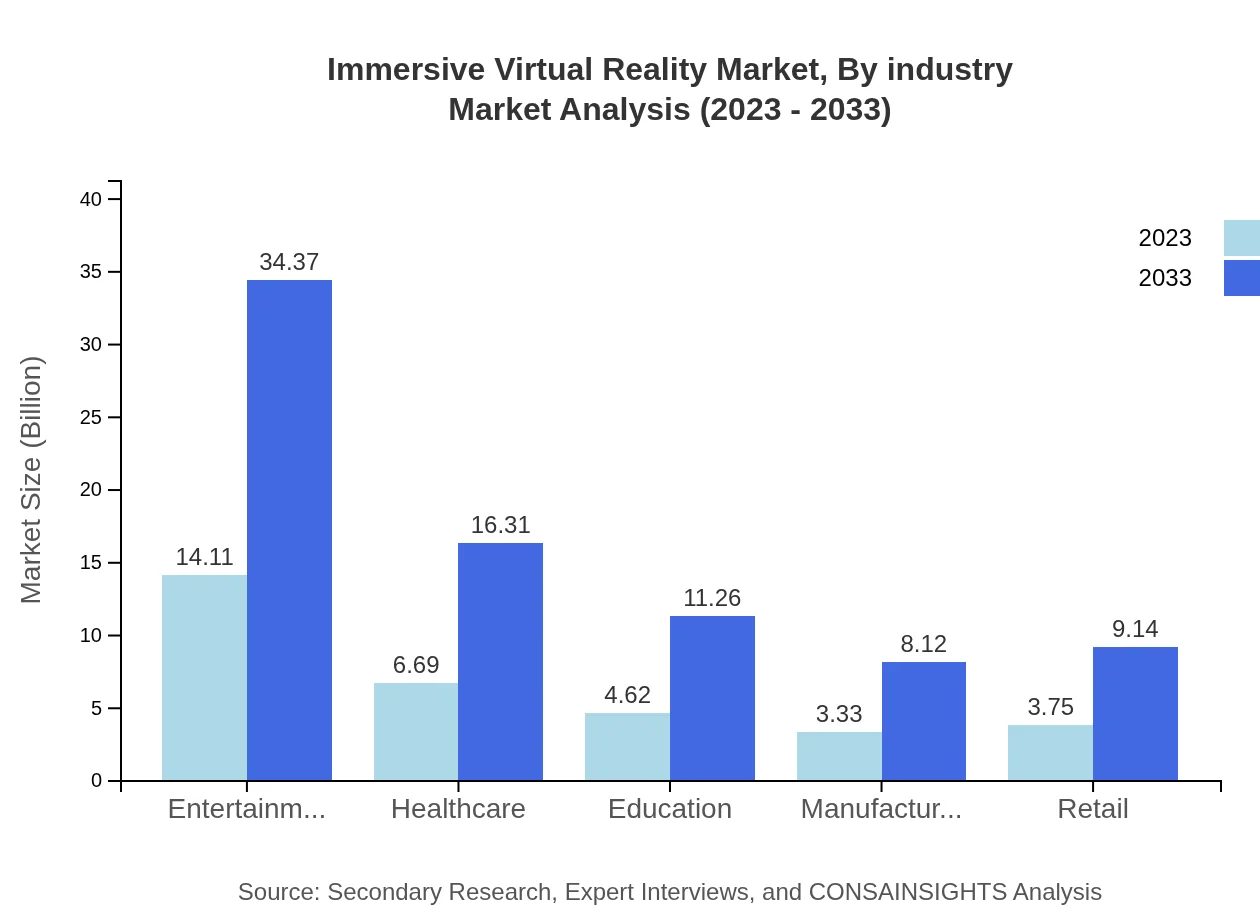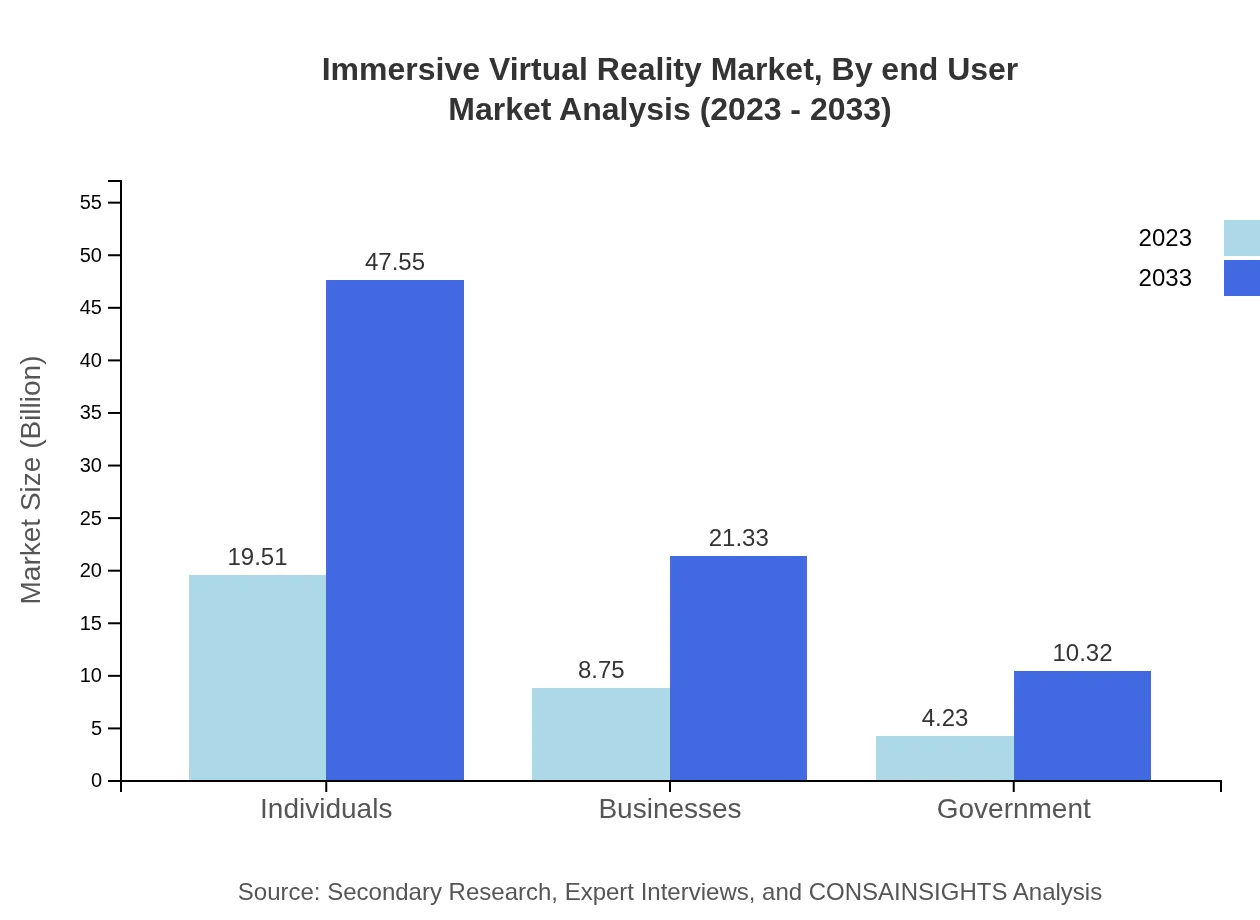Immersive Virtual Reality Market Report
Published Date: 31 January 2026 | Report Code: immersive-virtual-reality
Immersive Virtual Reality Market Size, Share, Industry Trends and Forecast to 2033
This report provides a comprehensive analysis of the Immersive Virtual Reality market, exploring current trends, market size, segmentation, and future forecasts through to 2033. It delves into regional insights and highlights key players shaping the industry.
| Metric | Value |
|---|---|
| Study Period | 2023 - 2033 |
| 2023 Market Size | $32.50 Billion |
| CAGR (2023-2033) | 9% |
| 2033 Market Size | $79.19 Billion |
| Top Companies | Oculus VR (Meta Platforms, Inc.), HTC Corporation, Sony Interactive Entertainment, NVIDIA Corporation, Microsoft Corporation |
| Last Modified Date | 31 January 2026 |
Immersive Virtual Reality Market Overview
Customize Immersive Virtual Reality Market Report market research report
- ✔ Get in-depth analysis of Immersive Virtual Reality market size, growth, and forecasts.
- ✔ Understand Immersive Virtual Reality's regional dynamics and industry-specific trends.
- ✔ Identify potential applications, end-user demand, and growth segments in Immersive Virtual Reality
What is the Market Size & CAGR of Immersive Virtual Reality market in 2023?
Immersive Virtual Reality Industry Analysis
Immersive Virtual Reality Market Segmentation and Scope
Tell us your focus area and get a customized research report.
Immersive Virtual Reality Market Analysis Report by Region
Europe Immersive Virtual Reality Market Report:
The European IVR market is predicted to expand from $9.44 billion in 2023 to $23.01 billion by 2033. The adoption of IVR in healthcare for simulation training and in the automotive industry for design checks showcases Europe's diverse application base, supported by increasing innovation and collaboration among tech firms.Asia Pacific Immersive Virtual Reality Market Report:
The Asia Pacific region is expected to witness considerable growth, with the market value projected to rise from $6.25 billion in 2023 to $15.24 billion by 2033. The surge is driven by increasing technology adoption in gaming and entertainment sectors, alongside substantial investments in the education and healthcare industries, enhancing user experience.North America Immersive Virtual Reality Market Report:
North America remains a front-runner in the IVR market, with projections soaring from $11.63 billion in 2023 to $28.34 billion by 2033. The region's technological maturity, robust investments in AR/VR technologies, and a flourishing entertainment sector underpin its significant market share and rapid growth trajectory.South America Immersive Virtual Reality Market Report:
In South America, the Immersive Virtual Reality market is anticipated to grow from $1.68 billion in 2023 to $4.09 billion by 2033. The growth potential is fueled by rising disposable incomes and the increasing popularity of gaming and educational applications, although the market faces infrastructural challenges that could hinder rapid expansion.Middle East & Africa Immersive Virtual Reality Market Report:
The Middle East and Africa region is projected to see market growth from $3.50 billion in 2023 to $8.52 billion by 2033. Key drivers include government support for technological initiatives, growing interest in virtual tourism, and increasing use of VR in educational institutions, despite economic fluctuations in certain areas.Tell us your focus area and get a customized research report.
Immersive Virtual Reality Market Analysis By Device
In 2023, the Mobile VR segment leads the industry with a market size of $19.51 billion, expected to reach $47.55 billion by 2033, maintaining a share of 60.04%. PC VR and Console VR follow, sharing the spotlight in shaping the immersive landscape.
Immersive Virtual Reality Market Analysis By Application
The application landscape is diverse, with gaming and entertainment capturing a significant share. By 2033, gaming is projected to account for around 43.4% of the market, underscoring IVR's importance in interactive experiences as educational applications grow to match.
Immersive Virtual Reality Market Analysis By Industry
Industries like healthcare and education are adopting immersive solutions increasingly, with respective market shares of 20.59% and 14.22% expected to rise as advancements improve training methodologies and enhance learning experiences.
Immersive Virtual Reality Market Analysis By End User
End-user dynamics reflect a broad reach, with individuals driving participation in gaming and entertainment, while businesses leverage IVR for training purposes. Government agencies also explore IVR for public service applications and military training.
Immersive Virtual Reality Market Trends and Future Forecast
Tell us your focus area and get a customized research report.
Global Market Leaders and Top Companies in Immersive Virtual Reality Industry
Oculus VR (Meta Platforms, Inc.):
Pioneering in VR technology, Oculus leads innovations in immersive experiences for gaming and entertainment, heavily investing in software applications for comprehensive engagement.HTC Corporation:
HTC is renowned for its Vive range, pushing the boundaries of immersive VR through advanced hardware that meets both consumer and enterprise needs.Sony Interactive Entertainment:
With its PlayStation VR offerings, Sony integrates VR into mainstream gaming, expanding the market through strategic alliances and innovative game titles.NVIDIA Corporation:
NVIDIA plays a crucial role by developing advanced graphical processing units and AI solutions that enhance the overall VR experience.Microsoft Corporation:
Focusing on mixed reality solutions, Microsoft's HoloLens targets enterprise and industrial applications, showcasing VR's potential beyond conventional uses.We're grateful to work with incredible clients.









FAQs
What is the market size of immersive Virtual Reality?
The immersive virtual reality market was valued at approximately $32.5 billion in 2023 and is expected to grow at a CAGR of 9%, reaching significant expansion by 2033.
What are the key market players or companies in this immersive Virtual Reality industry?
Key players in the immersive virtual reality industry include major tech companies such as Oculus, HTC, Sony, Microsoft, and various startups focusing on innovative VR technologies and applications across different sectors.
What are the primary factors driving the growth in the immersive Virtual Reality industry?
Growth in the immersive virtual reality industry can be attributed to advancements in technology, increased demand in gaming and entertainment, applications in healthcare and education, and growing investment in VR solutions by businesses.
Which region is the fastest Growing in the immersive Virtual Reality?
North America is currently the fastest-growing region in the immersive virtual reality market, projected to grow from $11.63 billion in 2023 to $28.34 billion by 2033, driven by innovations in technology and consumer adoption.
Does ConsaInsights provide customized market report data for the immersive Virtual Reality industry?
Yes, ConsaInsights offers customized market report data tailored to the immersive virtual reality industry, catering to specific business needs and providing insights on market trends, competitive landscape, and segment analysis.
What deliverables can I expect from this immersive Virtual Reality market research project?
Deliverables from the immersive virtual reality market research project typically include a comprehensive market analysis report, insights on regional and segment data, competitive landscape overviews, and tailored recommendations for market entry or expansion.
What are the market trends of immersive Virtual Reality?
Current trends in the immersive virtual reality market include increased adoption of mobile VR technologies, growth in VR applications in education and healthcare, refinements in hardware, and the rise of immersive experiences in retail and entertainment sectors.

